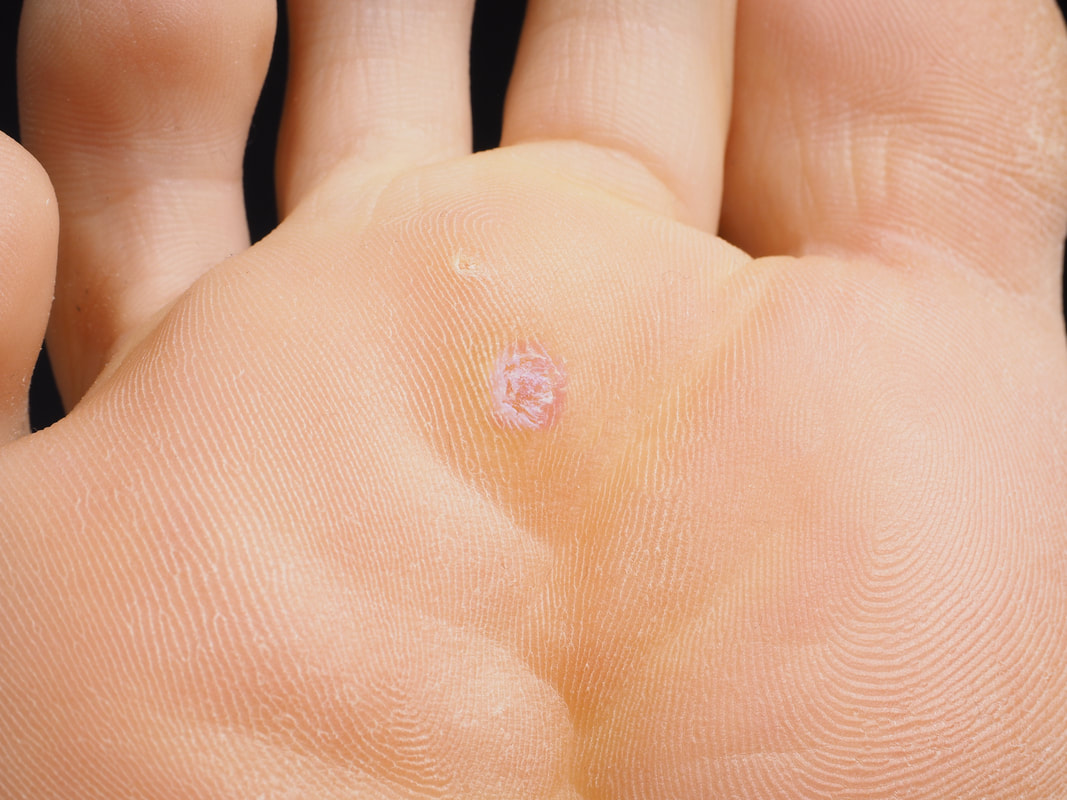Plantar warts are common in all age groups, but especially children. They are caused by a viral infection (Human Papillomavirus – HPV) and are often mistaken as a corn. They have many names or nicknames such as warts, plantar...
Plantar warts are common in all age groups, but especially children. They are caused by a viral infection (Human Papillomavirus – HPV) and are often mistaken as a corn. They have many names or nicknames such as warts, plantar warts, verruca, verruca pedis or Papilloma’s. They appear on the outer layers of the skin, often as a circular lesion, often with tiny small black dots throughout. The black dots are tiny blood vessels as plantar warts have both a blood supply and nerve supply. A great way you can attempt to self-diagnose a plantar wart is to squeeze or pinch the lesion. Squeezing or pinching a wart causes more pain than if you were to directly push or press on the lesion.
There are many different strains of warts and they can occur anywhere on your body. On your hand or knee they will often protrude out as a lump, whereas on the bottom (plantar aspect) of your foot they appear flatter as they get pushed into your foot by walking on them. They can occur as a single wart, but they can also have a number of babies!
Unfortunately, there is not one treatment that will 100% of the time successfully remove or clear up the wart after one treatment, two of even three treatments. Generally, our treatments are aimed at causing trauma to the plantar wart. This can trigger an immune response. Once your immune system recognises the virus it can begin to fight off this viral infection, since a plantar wart lives undetected and unwanted on your foot like a parasite! We don’t always recommend treatment, but will certainly recommend intervention if the plantar wart is painful, increasing in size or having babies!
Not all treatments are painful and we usually start by removing overlying dead skin (callous). Active Podiatry now offers the latest technology in treating warts called SWIFT Wart Therapy. SWIFT is a very recent addition to the clinic and also has the highest resolution rate (83%) of all the types of treatments we offer and unlike the other treatments no dressings are required following this treatment.
Some other methods we use in the clinic are high dose salicylic acid. Salicylic acid is generally not painful and is often suitable for kids or those with a low pain tolerance! The type of treatment is often dictated by the age or pain tolerance of the person, or the type and number of warts. Other treatments include liquid nitrogen (freezing) and Falknor’s needling technique.
If you think you have a plantar wart, call for an appointment with one of our Podiatrists and we can tailor and discuss the best type of treatment for you!
There are many different strains of warts and they can occur anywhere on your body. On your hand or knee they will often protrude out as a lump, whereas on the bottom (plantar aspect) of your foot they appear flatter as they get pushed into your foot by walking on them. They can occur as a single wart, but they can also have a number of babies!
Unfortunately, there is not one treatment that will 100% of the time successfully remove or clear up the wart after one treatment, two of even three treatments. Generally, our treatments are aimed at causing trauma to the plantar wart. This can trigger an immune response. Once your immune system recognises the virus it can begin to fight off this viral infection, since a plantar wart lives undetected and unwanted on your foot like a parasite! We don’t always recommend treatment, but will certainly recommend intervention if the plantar wart is painful, increasing in size or having babies!
Not all treatments are painful and we usually start by removing overlying dead skin (callous). Active Podiatry now offers the latest technology in treating warts called SWIFT Wart Therapy. SWIFT is a very recent addition to the clinic and also has the highest resolution rate (83%) of all the types of treatments we offer and unlike the other treatments no dressings are required following this treatment.
Some other methods we use in the clinic are high dose salicylic acid. Salicylic acid is generally not painful and is often suitable for kids or those with a low pain tolerance! The type of treatment is often dictated by the age or pain tolerance of the person, or the type and number of warts. Other treatments include liquid nitrogen (freezing) and Falknor’s needling technique.
If you think you have a plantar wart, call for an appointment with one of our Podiatrists and we can tailor and discuss the best type of treatment for you!








